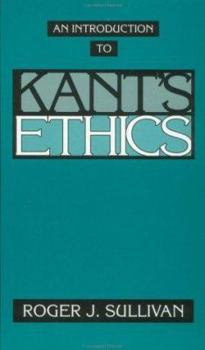An Introduction to Kant's Ethics
Select Format
Select Condition 
Book Overview
This is the most up-to-date, brief and accessible introduction to Kant's ethics available. It approaches the moral theory via the political philosophy, thus allowing the reader to appreciate why Kant... This description may be from another edition of this product.
Format:Paperback
Language:English
ISBN:0521467691
ISBN13:9780521467698
Release Date:July 1994
Publisher:Cambridge University Press
Length:192 Pages
Weight:0.60 lbs.
Dimensions:0.5" x 5.5" x 8.4"
Customer Reviews
4 ratings
High-Level Cliff Notes (In a Good Sense)
Published by Thriftbooks.com User , 15 years ago
This book is a short, tight, and clearly-written exposition of Kant's "Groundwork of the Metaphysics of Morals" (perhaps the most horribly-named book in the history of philosophy). Kant is difficult; Sullivan helps to make him clear. Readers should know, however, that Sullivan limits himself to unpacking and restating Kant's argument. He doesn't critique it or compare it to rival moral theories (such as Hume's). For that reason I knocked off one star.
Getting Kant right
Published by Thriftbooks.com User , 15 years ago
Very informative in a straightforward and clear style. Kant is is often misunderstood and this books gets it right. A nice introduction to Kant's metaethicseven for beginners.
Great introduction to Kant's ethics
Published by Thriftbooks.com User , 16 years ago
The problem with Kant's political theory is that it is not found in one work. His ethics is spread out in Critique of Pure Reason, Groundworks of the Metaphysics of Morals, Critique of Practical Reason and many more. Taken the fact that Kant's language (even in German) is anything but easy to understand and that most students never move beyond the "Groundworks of the Metaphysics of Morals" Sullivan's introduction is a gold mine! It's easy to read, explains the concepts and the development of Kant's thought and points you to the relevant further readings if needed.
My favorite intro to Kant's ethical theory
Published by Thriftbooks.com User , 21 years ago
There are so many books written about Kant that one could almost emend the statement, "Of the making of books, there is no end" to "Of the making of books on Kant, there is no end." Kant is not merely studied, he is studied in enormous depth and with a passion and meticulousness reserved for few philosophers in history. When I was working on my Ph.D. in philosophy, even though I had read dozens of books on Kant, and was planning on spending half of my doctoral thesis on aspects of his moral thought, I would never have dreamed, in academic parlance, of describing myself as a Kant "specialist." I remained hesitant to even acknowledge myself as "competent" in Kant's ethics.Of all the books I read on Kant's ethics, I found this one to be the best at providing an overview of Kant's moral thought and how it related to his work as a whole. Sullivan resists the widespread tendency to subdivide Kant. There are Kant scholars who expend all their efforts on one aspect of Kant's philosophy, with little effort to explain the connections with the rest of his work or to show how the two interrelate and, in fact, require one another. Moreover, even scholars working with Kant's moral theory oftentimes focus on one or two or perhaps three texts to the exclusion of the rest of his work, to the point of ignoring completely what Kant has to say about ethics in some of his works less directly concerned with moral philosophy. For instance, it is impossible to understand Kant's views about the demands of the moral law if one does not also understand his thinking about immortality. A larger number of Kant scholars have attempted to understand his ethical thought with no reference to his religious philosophy, but this isn't understanding Kant so much as preparing a fully secularized version of Kant (in fact, Kant is pretty secular even after brining all his religious beliefs to bear, but that is a separate issue).Sullivan is marvelous at taking a particular issue in Kant, and then discussing it across a variety of texts, sometimes texts that even specialists ignore. His work is primarily integrative and synthetic, although there is also a strong analytical strain. If I were to teach a course on Kant's ethics, this is the book I would use as a secondary source. If I were taking a course on Kant's ethics, this is the book I would rely on most, apart from Kant's own writings. Advanced students and scholars will argue with many aspects of Sullivan's exposition, but no book on Kant enjoys universal approbation. But I question whether anyone studying Kant's work for the first time or trying to study his moral thought as a whole will find a more helpful book than this. It is to be recommended for its breadth, its comprehensiveness, and its clarity.




